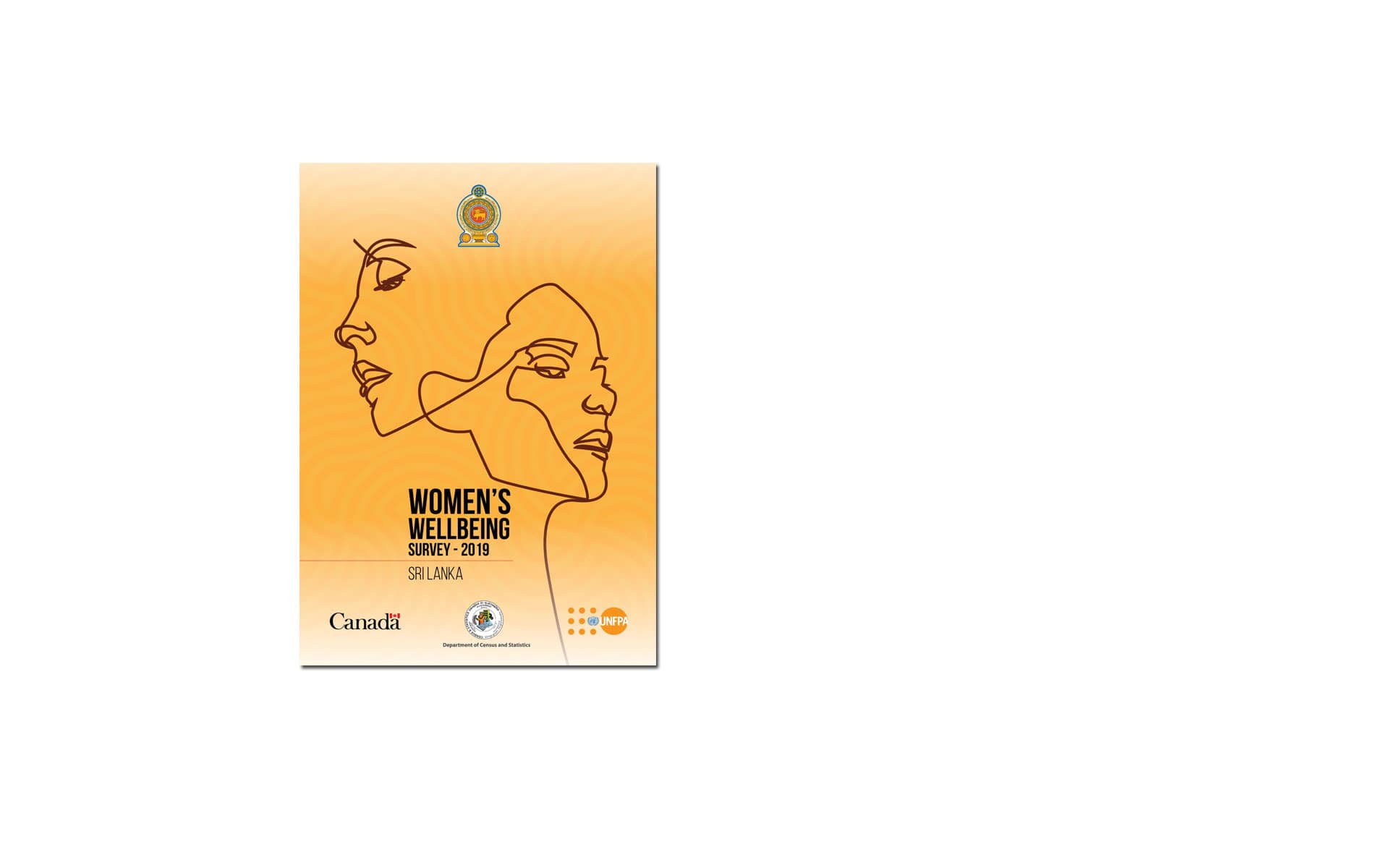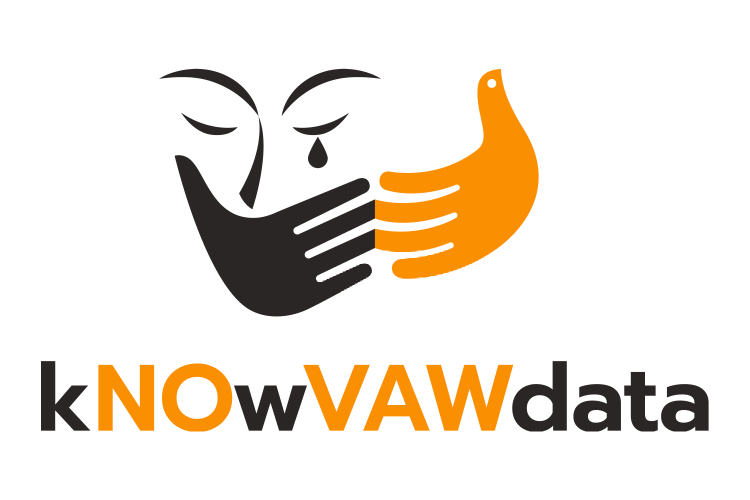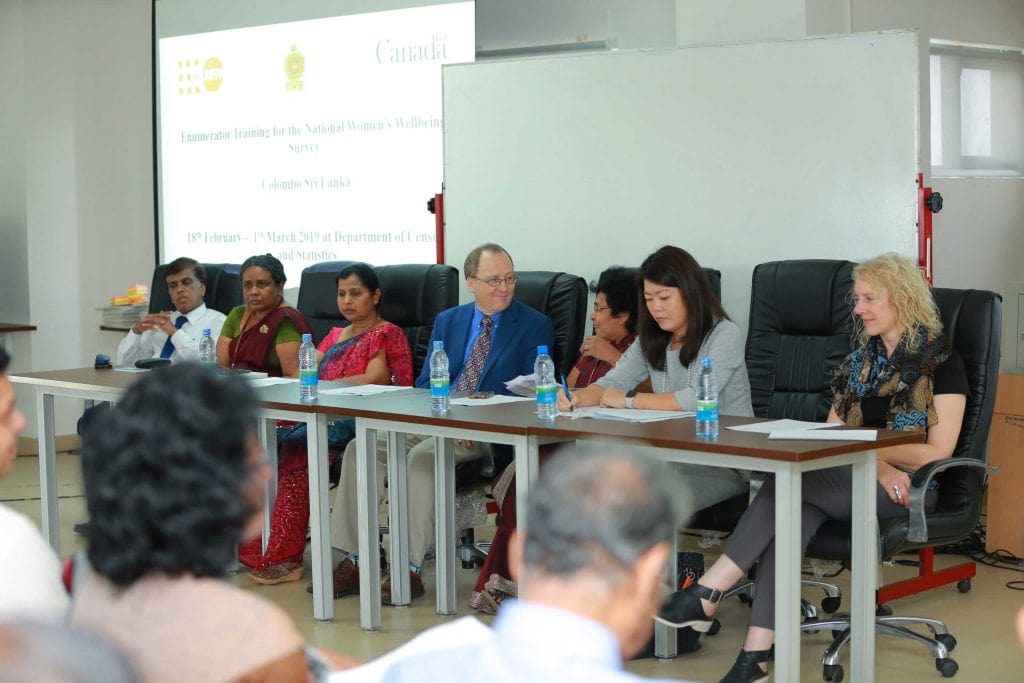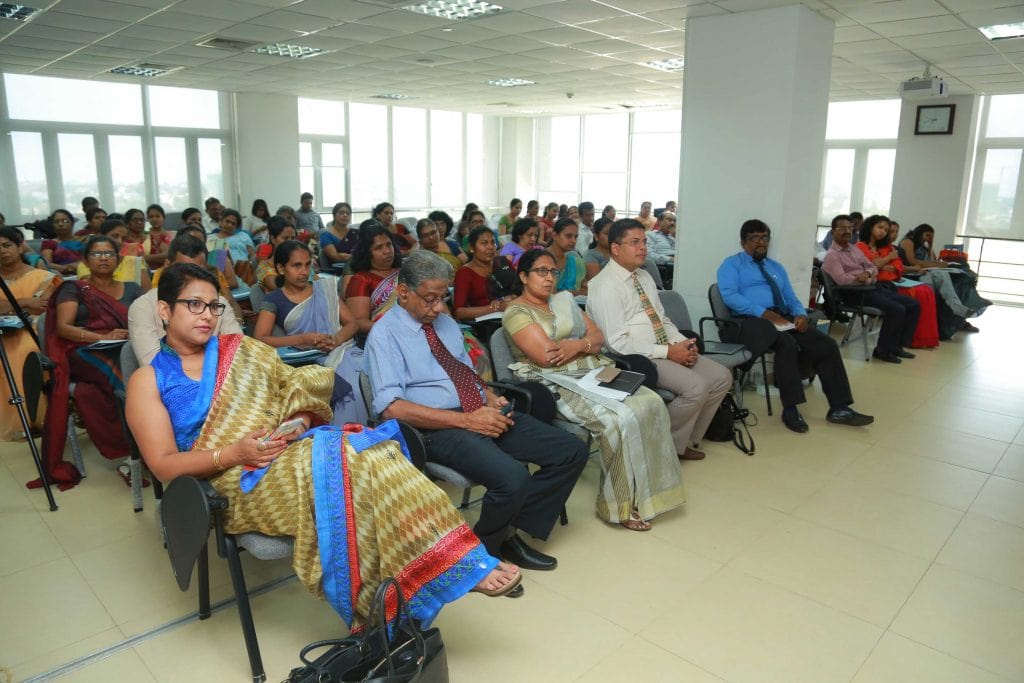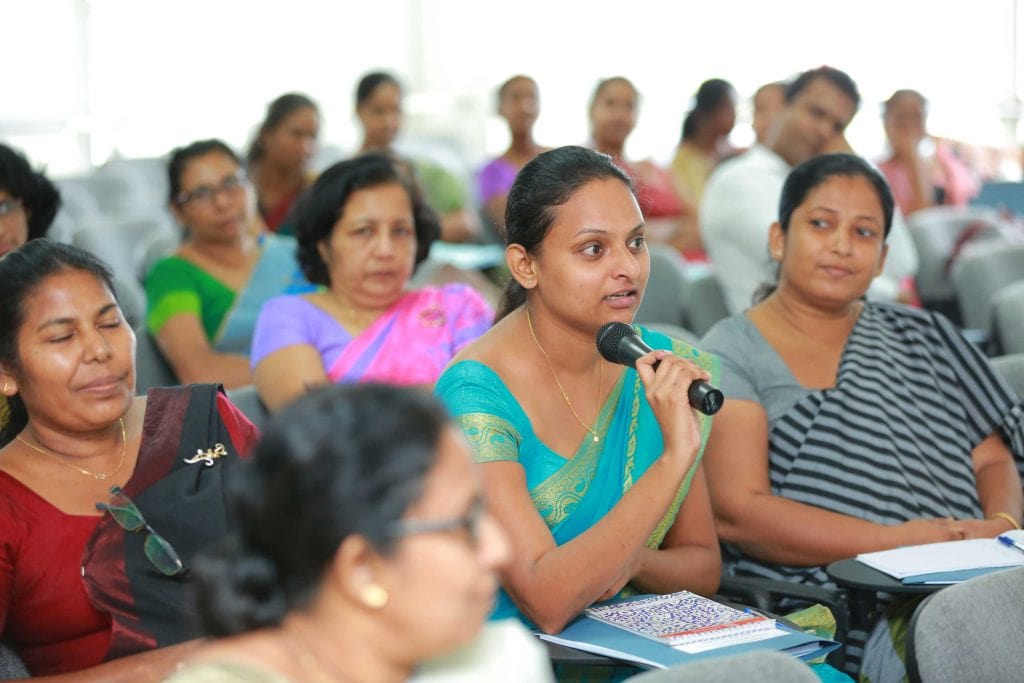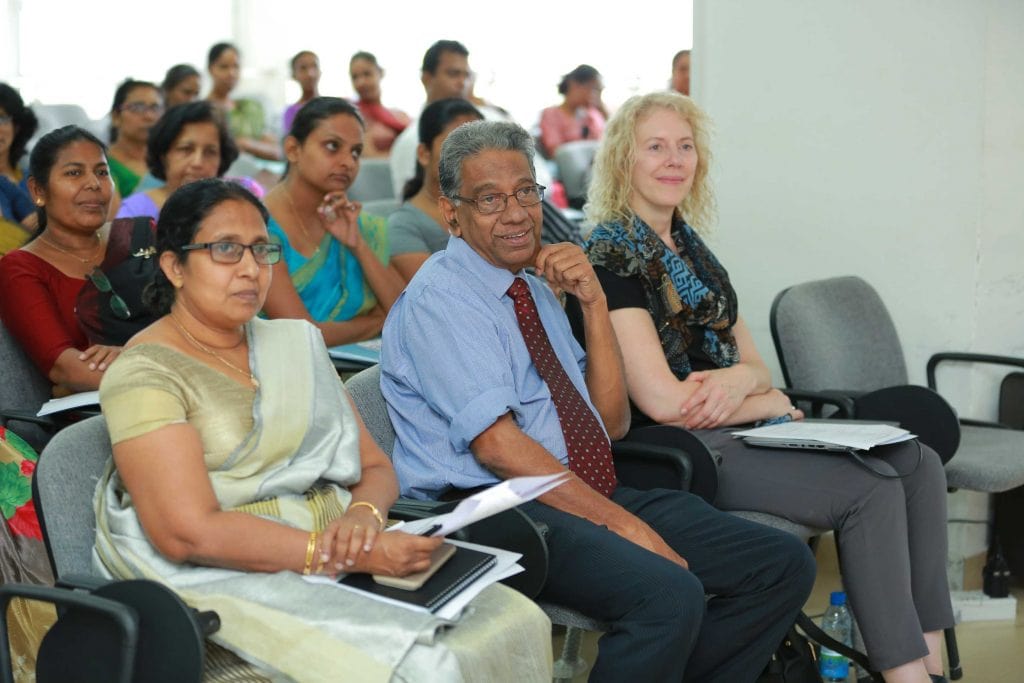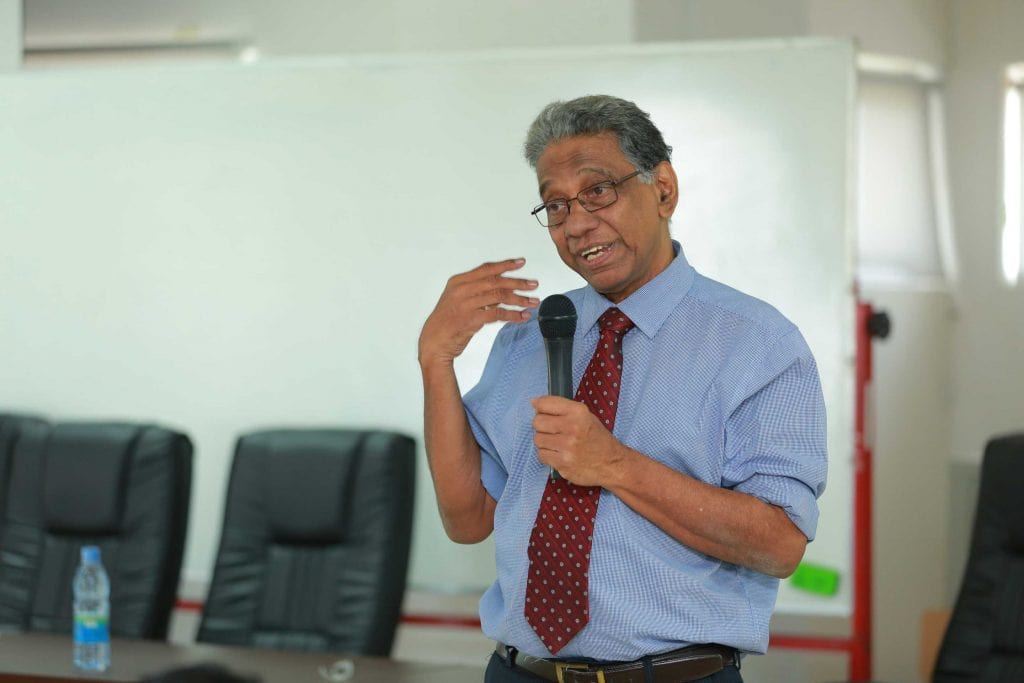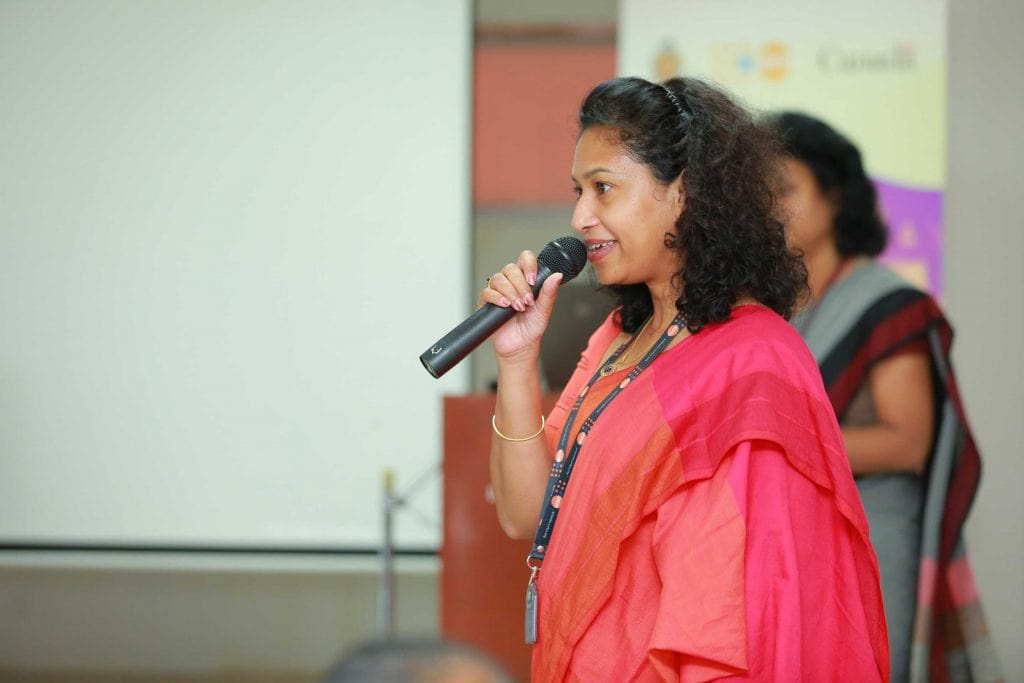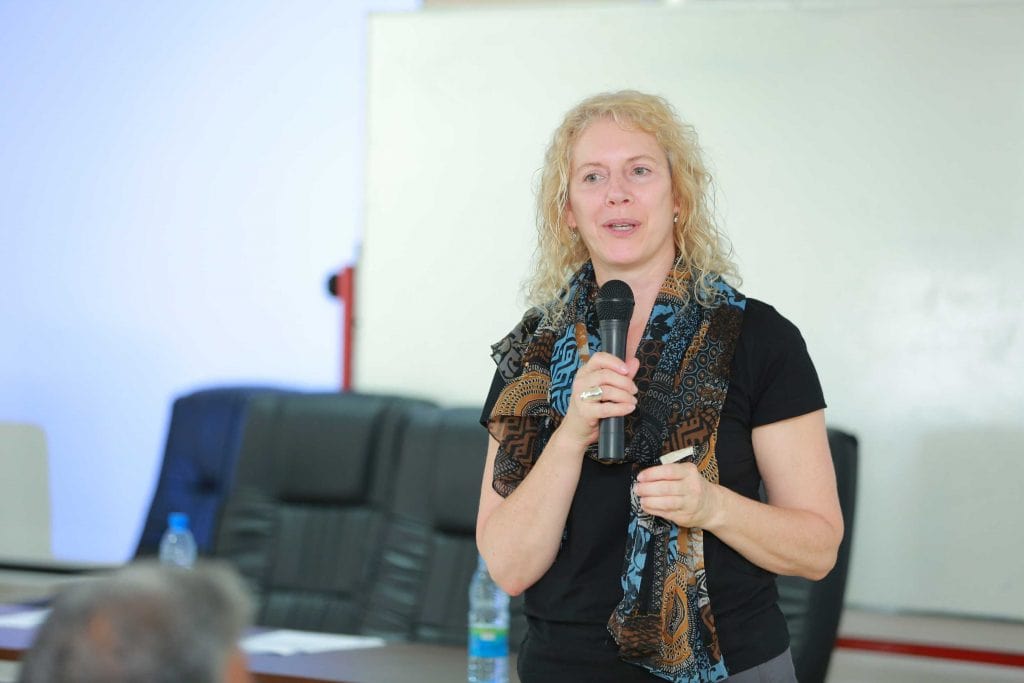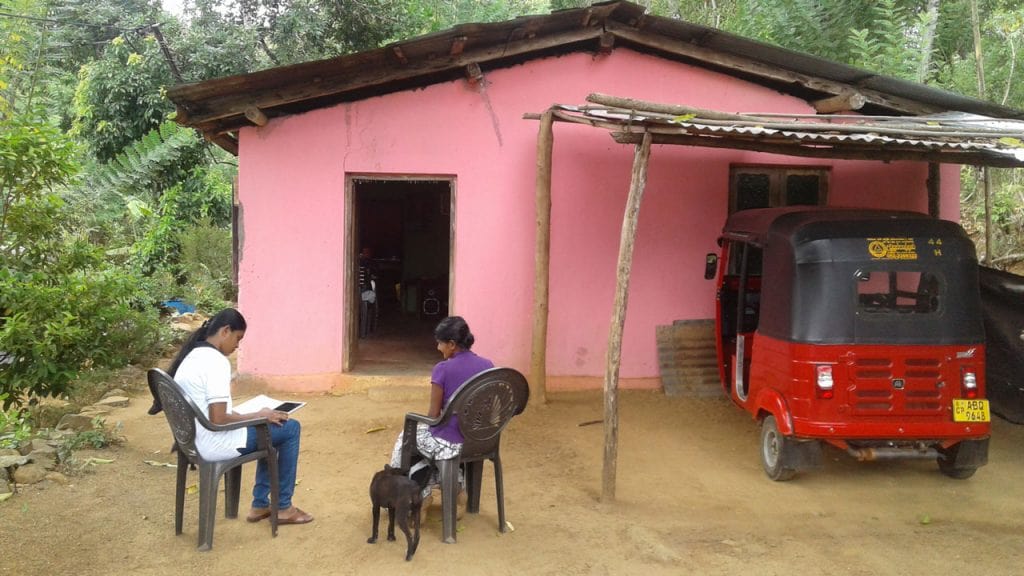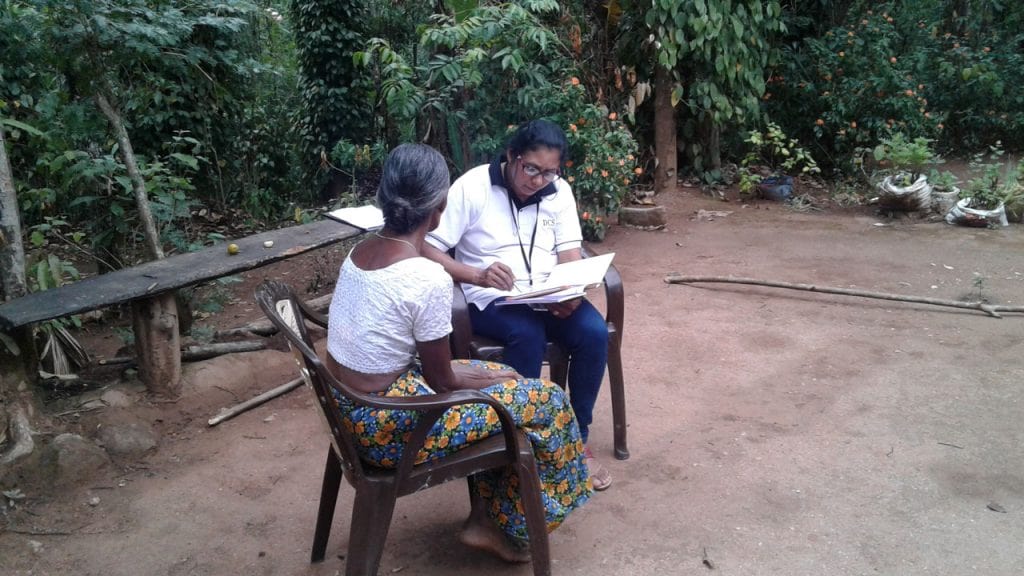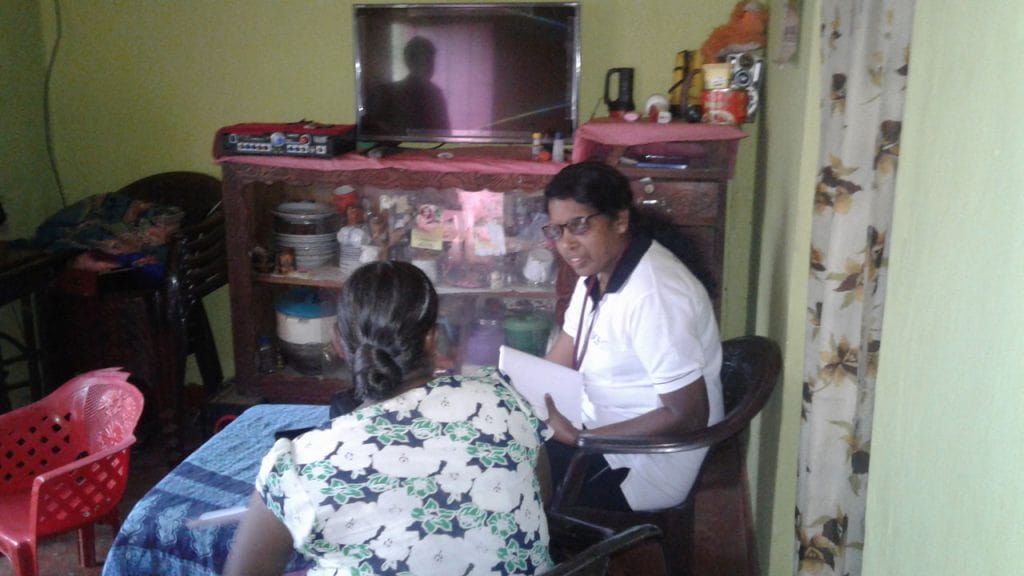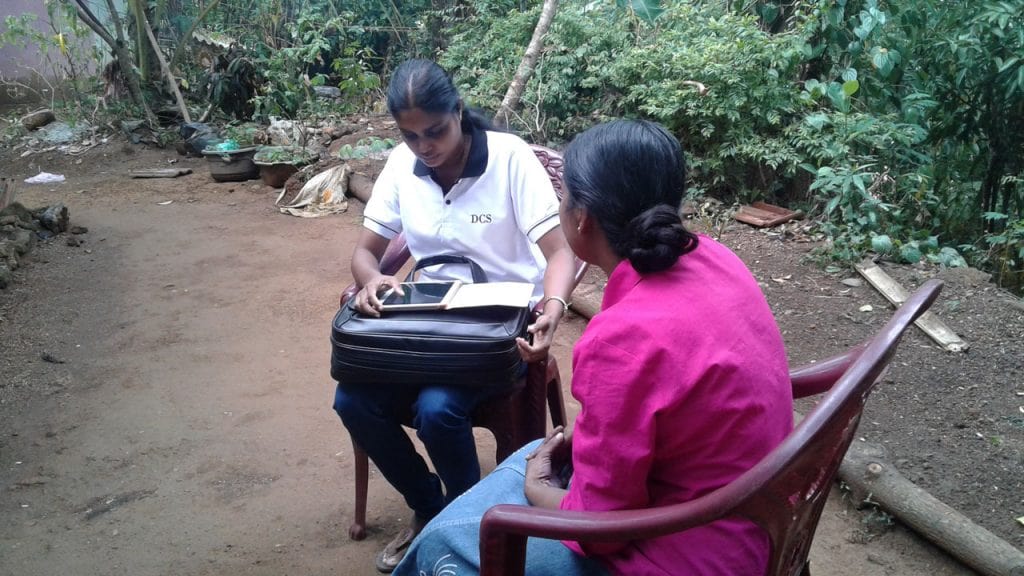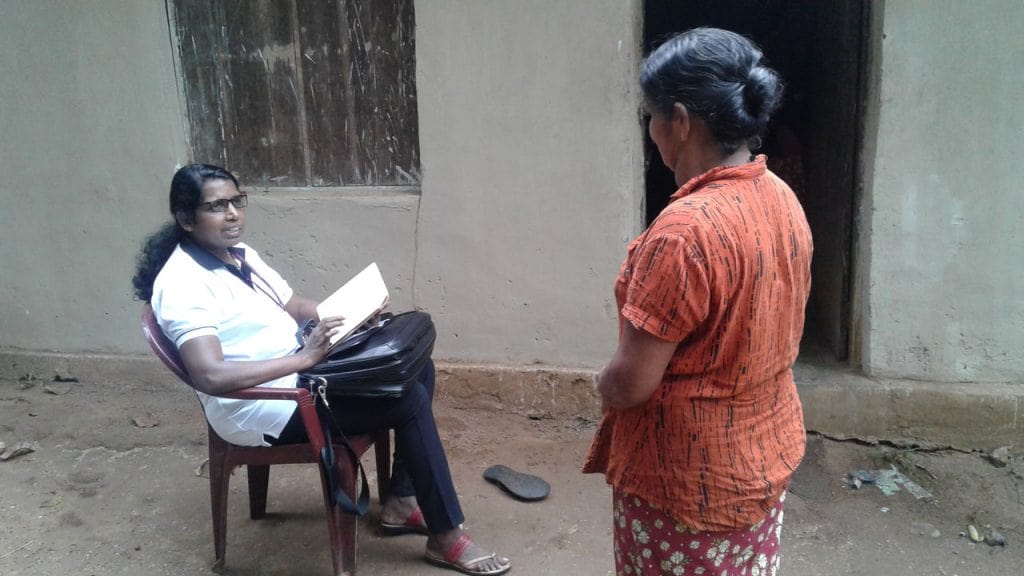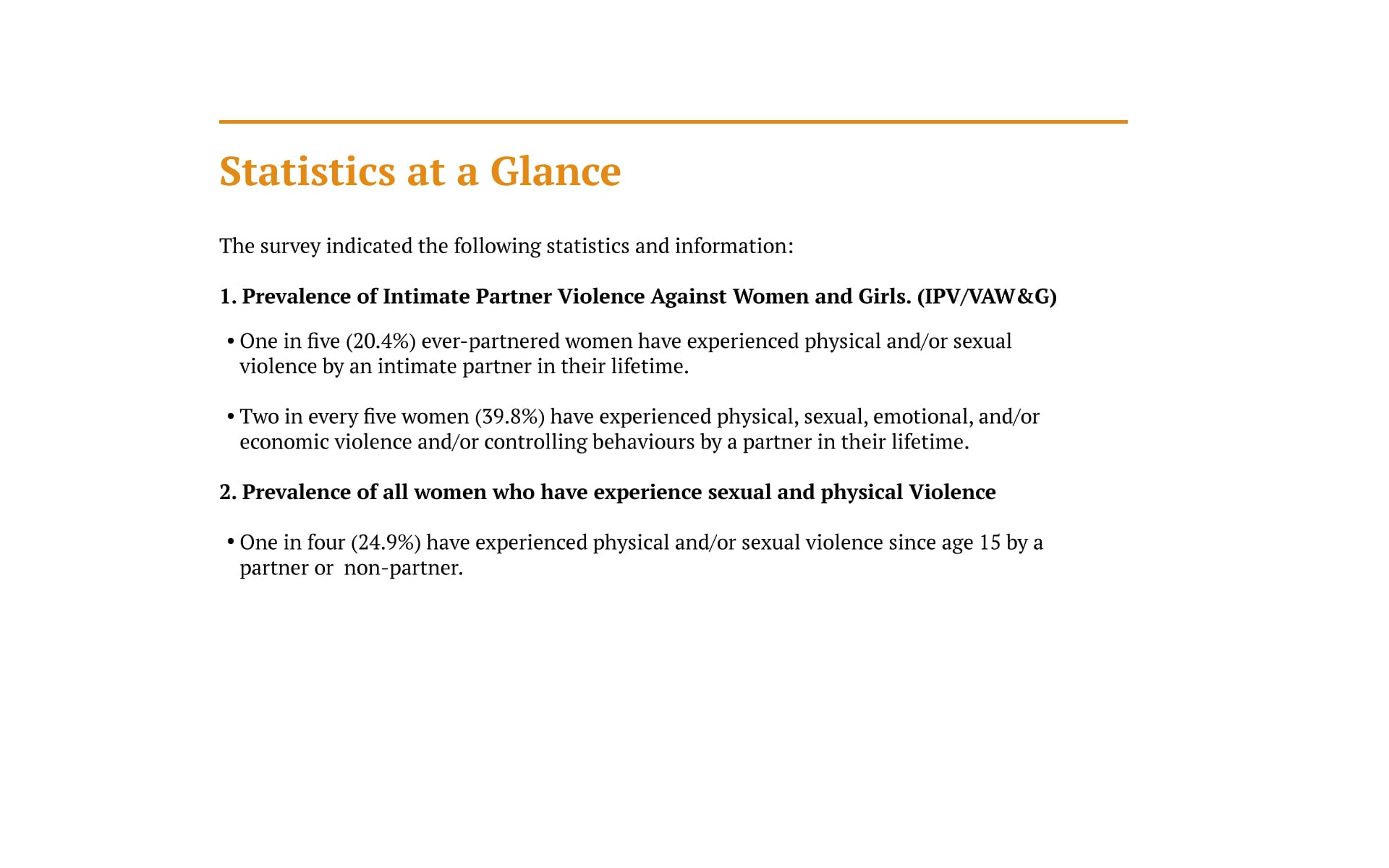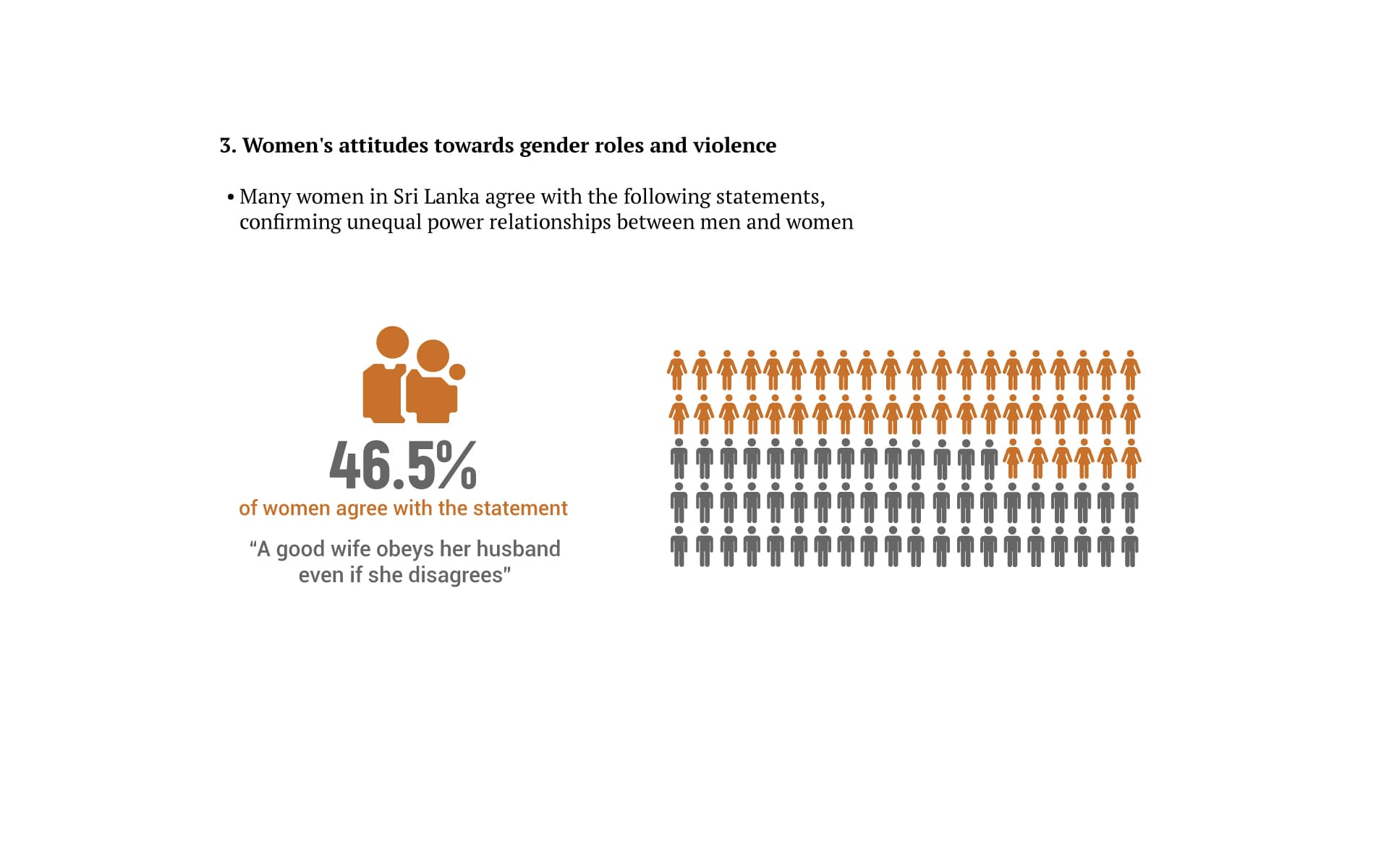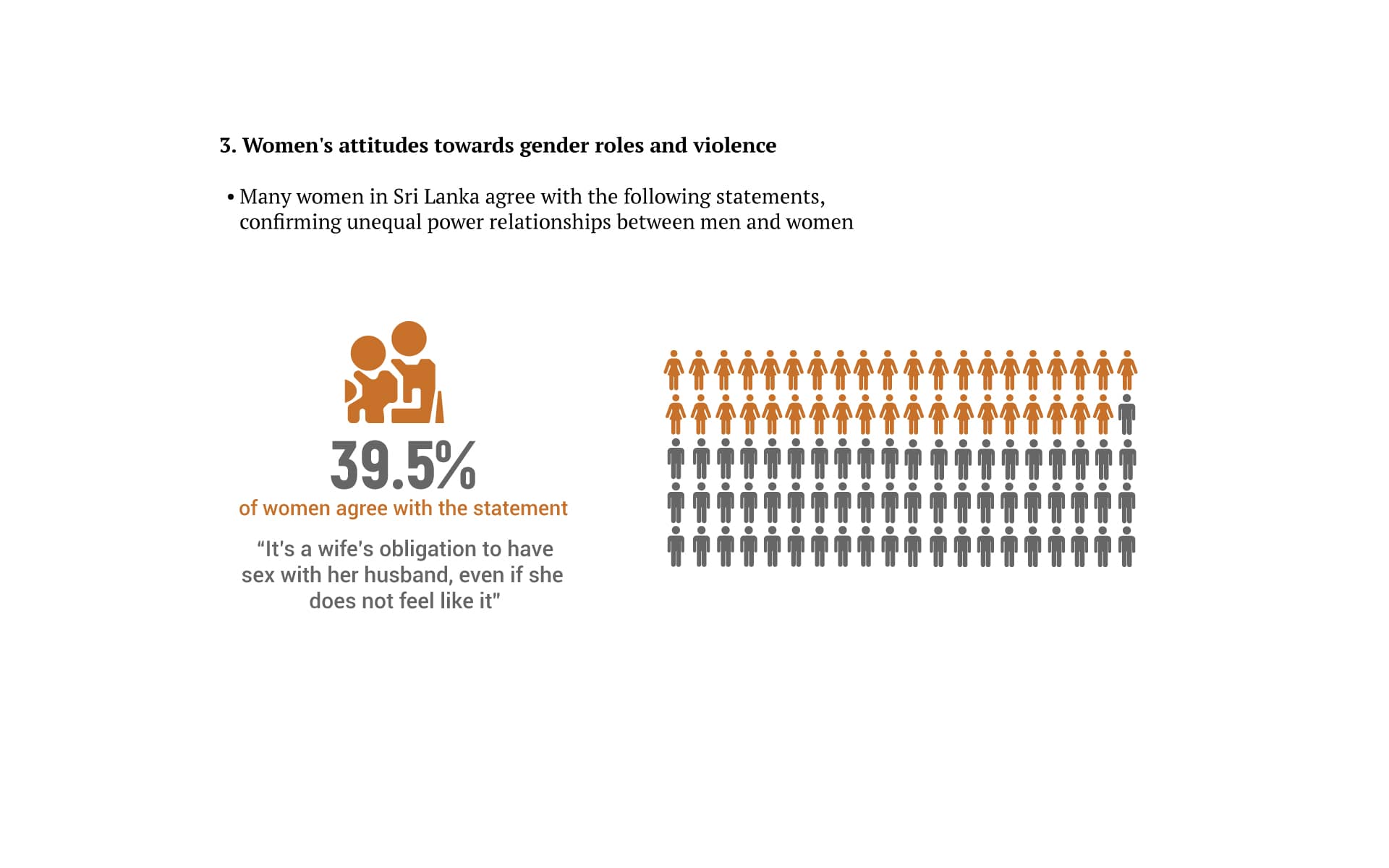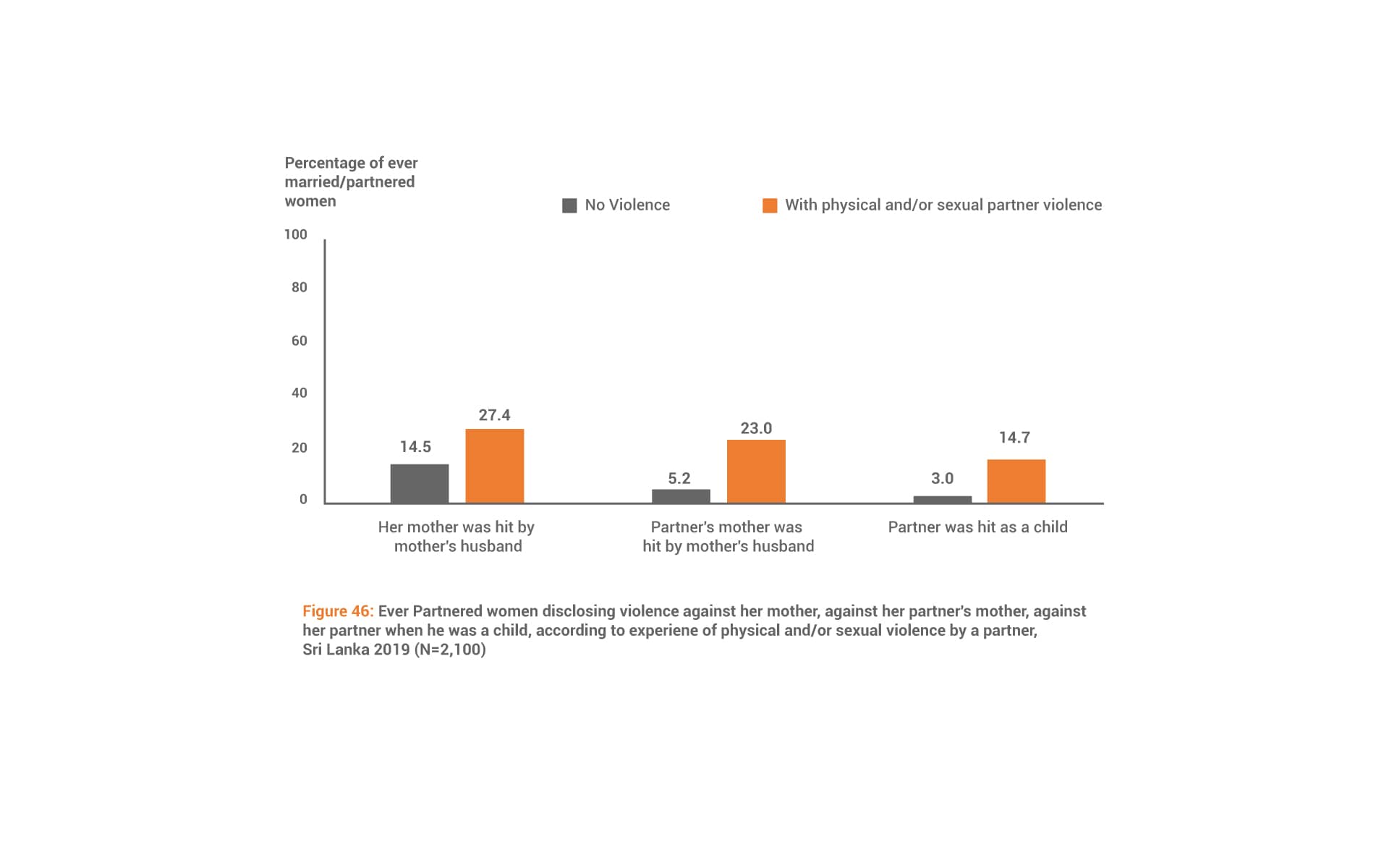Behind the Scenes
The first-ever national survey on the prevalence of violence against women and girls in Sri Lanka.
The Women’s Wellbeing Survey was carried out in 2019 by the Department of Census and Statistics (DCS) with technical assistance from the United Nations Population Fund (UNFPA) and funding from the Government of Canada.
“This survey has opened my eyes to the atrocities happening to women. I never thought we had this kind of problem in our society until I participated in this survey, we were in denial of the issue till we conducted the survey.” – Statistical Officer/Women’s Wellbeing Survey Enumerator, Sri Lanka.
The Journey
In 2016, the UNFPA advocated with national partners for the need to conduct a national-level prevalence survey to establish baseline data for Violence Against Women (VAW). The lack of quantitative prevalence data limits understanding of the scope and gravity of the issue, and impedes structural and systematic changes that are required to address the issue in a comprehensive manner. The lack of evidence-based policies further marginalizes the impoverished and vulnerable communities that are already left behind from the development agenda.
Discussion with the then Director General of the Department of Census and Statistics, in 2017 Dr. A. J. Satharasinghe, agreeing to conduct the survey and cabinet approval being received in 2018 were key milestones.
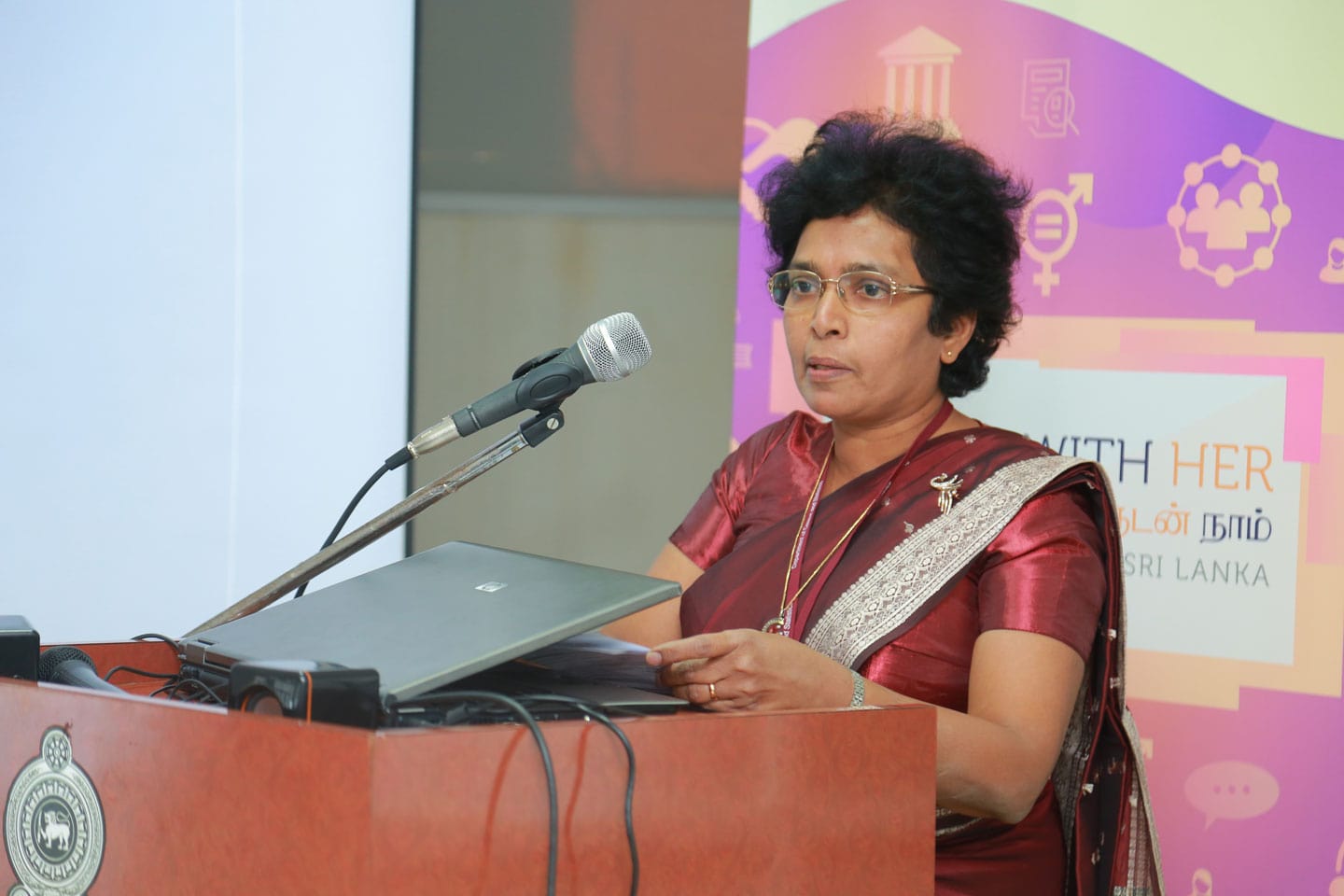
“DCS and UNFPA put in place the relevant programmes in 2017 and launched the field visits in 2019. It took 2 years to plan and execute,” says Dr. Indu Bandara, then Director General of DCS. “What was special about this survey is that we worked with women over the age of 15 years for this research. We needed to talk to them about instances of domestic abuse that they faced so we needed to be sensitive to their issues and challenges when speaking to them.”
The planning and execution of the data collection was under guidance of the Sample Survey Division. Given the special nature of this survey they had to plan the survey in a manner that would safeguard both the respondent and the enumerator.
“UNFPA brought in Dr. Henriette Jansen who conducted sensitization sessions for the officers of the State Ministry of Women and Child Development, Pre-Schools & Primary Education, School Infrastructure & Education Services and the staff of DCS and laid the foundation to develop the protocol for the first-ever national survey on the issue”
Sensitization and Training of Enumerators
In 2019, 56 female enumerators were selected for a two-week training by the Department of Census and Statistics (DCS) at the DCS office in Battaramulla. The Enumerators came from diverse backgrounds and all parts of the country. Unlike in other countries where social workers were recruited based on their sensitivity to the issue, in Sri Lanka it was conducted by the officers of DCS itself which also created a sense of accountability.
They were well-trained professionals with many years of service working in the field conducting surveys and research as the official census taker for the Sri Lankan government for over 72 years. However, none of the surveys conducted was on this issue even though a few questions of the VAW module in the DHS was administered in 2017. Further, the use of CAPI technology and tablets for data collection was new to some enumerators. This training attempted to mentally prepare the enumerators to administer the questions; the use of new technology and how they can overcome challenges in the field.
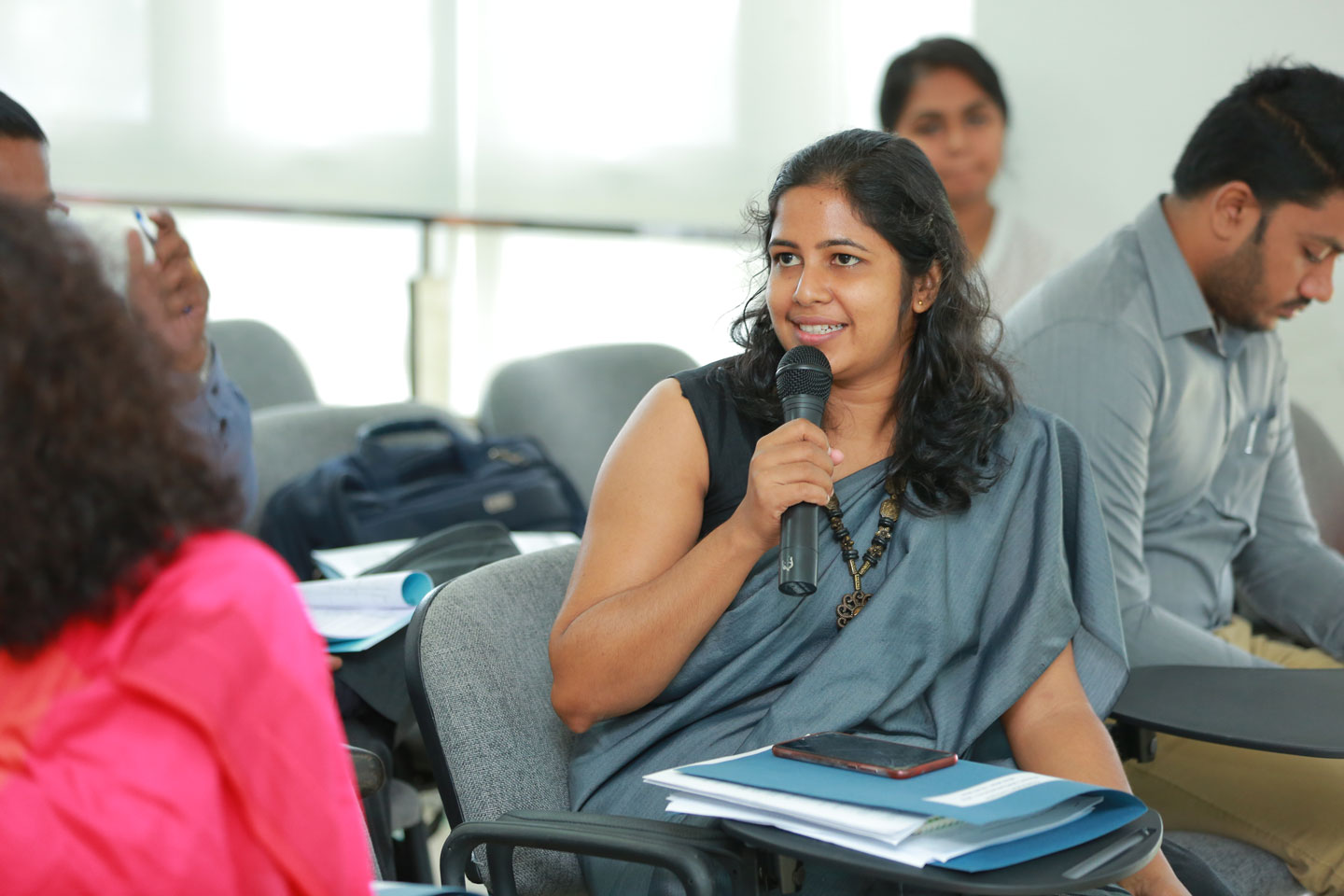
The program was formulated to help them navigate through difficult circumstances and the questions itself. Since it was the first time they were conducting a dedicated survey that collects sensitive personal information of individuals, there was much discussion on the relevance and how they can approach respondents.
The participants and Enumerators would face situations neither had faced previously. The training aimed to increase the sensitivity of the enumerators to violence against women and girls and how they can effectively collect the information needed: The Enumerators attending the training – both men and women – needed to learn the skills on how to interview the respondents with empathy but also be able to control their innate biases. This required that they first confront their own prejudices and opinions and ensure they look at the survey from a professional perspective. This was not an easy process given the questions itself were those confronting their own beliefs and attitudes.
The training gave them the chance to understand and clarify the reasons for the questions and how they engage with the respondent to make them feel comfortable. It was also an opportunity to debate about the particular words used in the survey. This further validated the questionnaire and alterations were made to make the questions more culturally sensitive, especially to capture the nuances in the local language. The training hall was alive with their voices and each person worked hard to grasp the subject matter. The international experts were able to explain and further share experiences of surveys conducted in other countries.
“The training was good and we benefited from relevant experience with the training. We work in the field and have done many researches. But this is special because I too am a woman. We learnt about the problems faced by women in society through the training,” said one Enumerator. “We also learned about how these researches are carried out in other countries. We only have experience with research in this country. But here, we received training from international trainers which helped us increase our own understanding.”
Sensitization
13 teams were deployed, of which 11 were Sinhala-speaking and 2 were Tamil-speaking teams based on the population. As per the survey protocol only female officers were engaged in data collection, while team leaders were either male or female, depending on availability of officials.
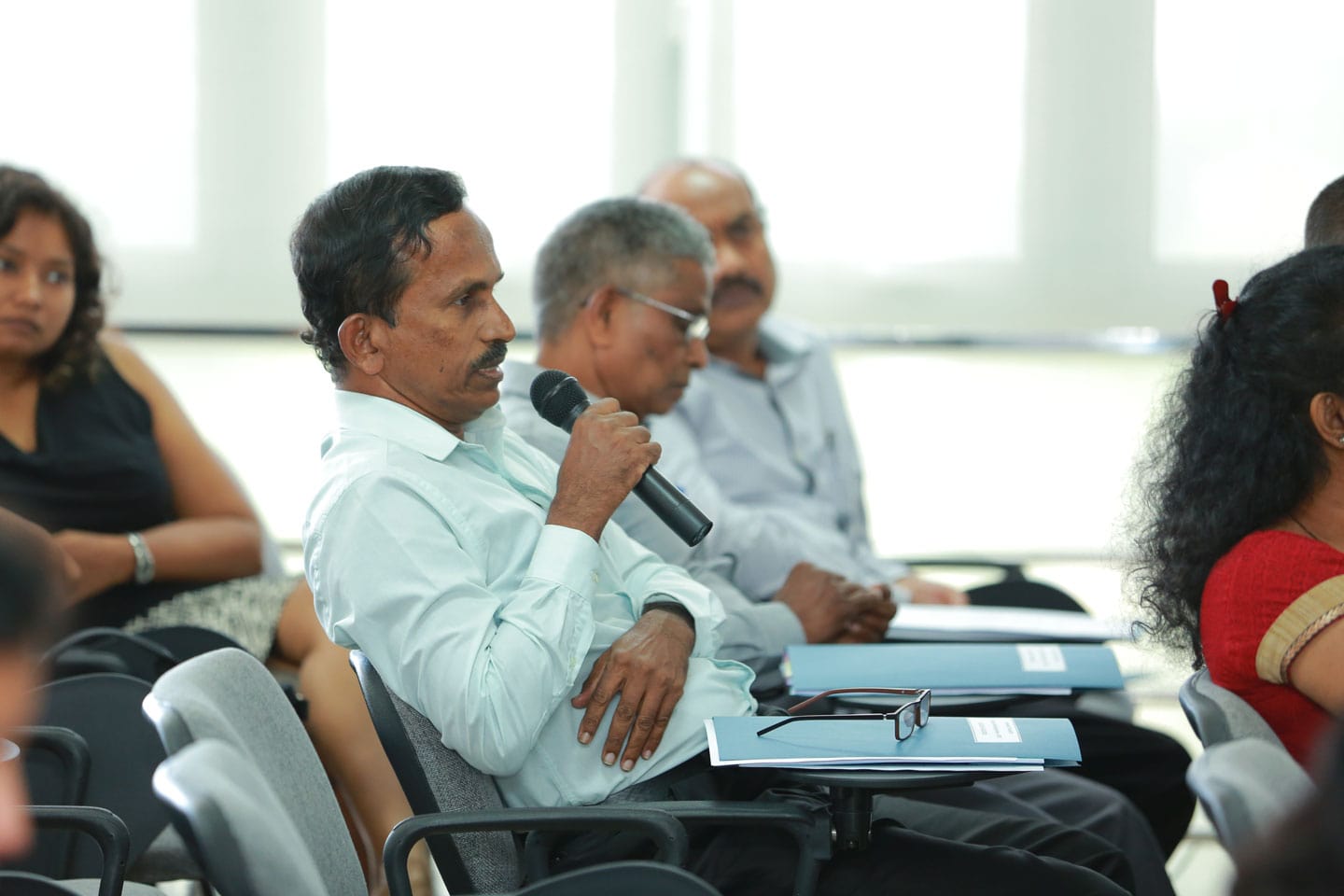
Selecting the team members from within the resource pool was important given the nature of the survey, the lack of any previous exposure to such surveys or women’s issues of this nature was a challenge that needed to be overcome through the training. It was essential that the Enumerators were emotionally and technically prepared for any situation that could arise and for any information that the respondents might share with them.
All interviews were conducted using a tablet, which ensured that the data collection process was accurate and confidential. The field work was conducted in 3 rounds. The first occurred from the last week of March to first week of April.
The second round was delayed to a national emergency that affected the entire country and created tensions among the different communities.
On Easter Sunday three churches in Sri Lanka and three luxury hotels in the commercial capital, of Colombo, were targeted in a series of coordinated terrorist suicide bombings.
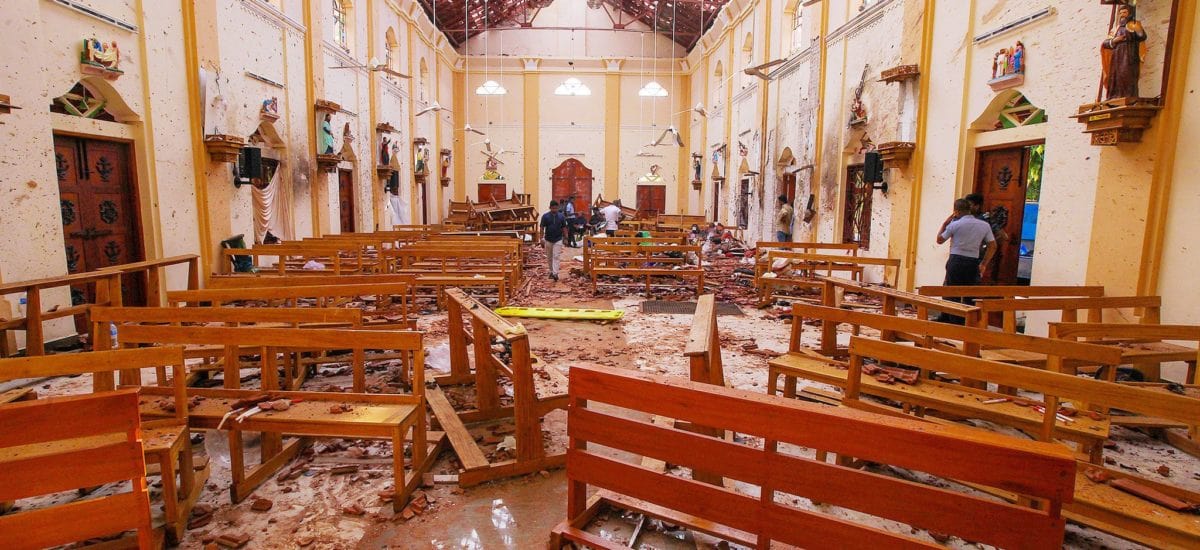
The Easter Attacks created much turmoil and ethnic tension within the country creating a challenge to DCS. According to the field plan, two teams were not assigned to do field work on 1st round. Due to delay of the 2nd round, the UNFPA together with Senior Consultant Dr. Lakshman Senayake and NPPA Gender & WR conducted a refresher training and took the enumerators through the tip sheet for conducting interviews at the Vauvniya District Secretariat. This gave the enumerators more confidence to proceed as planned. The UNFPA CO also ensured that the enumerators had access to a counsellor 24X7 by contracting WIN (local women’s organization Women in Need) to dedicate 2 Sinhala and 1 Tamil counsellor during the time of the survey.
The 2nd and 3rd rounds were conducted from end of June 2019 to the 1st week of September 2019. The information collected at each interview was swiftly recorded and promptly uploaded each day to the central server of the DCS Office.
The survey collected personal information that included physical, emotional, sexual and economic violence as well as controlling behaviors by intimate partners.
The flow of the questionnaire helped the Enumerators gain more accurate answers given the questionnaire was tried and tested across other Asian countries for the last decade. As per the survey protocol, no information of the respondent was recorded.
Field Visits
Statistician Mineka Subhashini emphasized that the training the Enumerators received at the beginning of the year stood them in good stead when they met the women being interviewed: “The sessions with the international trainers allowed them to see how relevant and important this survey was and prepared them for meeting the respondents. These trainings changed their perception: They came to realize that the survey was essential and timely. Although they had previously asked 10 of these questions in their DHS-2016 survey, this survey’s depth and detail was new to them.” She further highlighted that the 4-week “kNOwVAWdata” course in Bangkok and Melbourne in partnership with the University of Melbourne supported immensely in rolling out the survey.
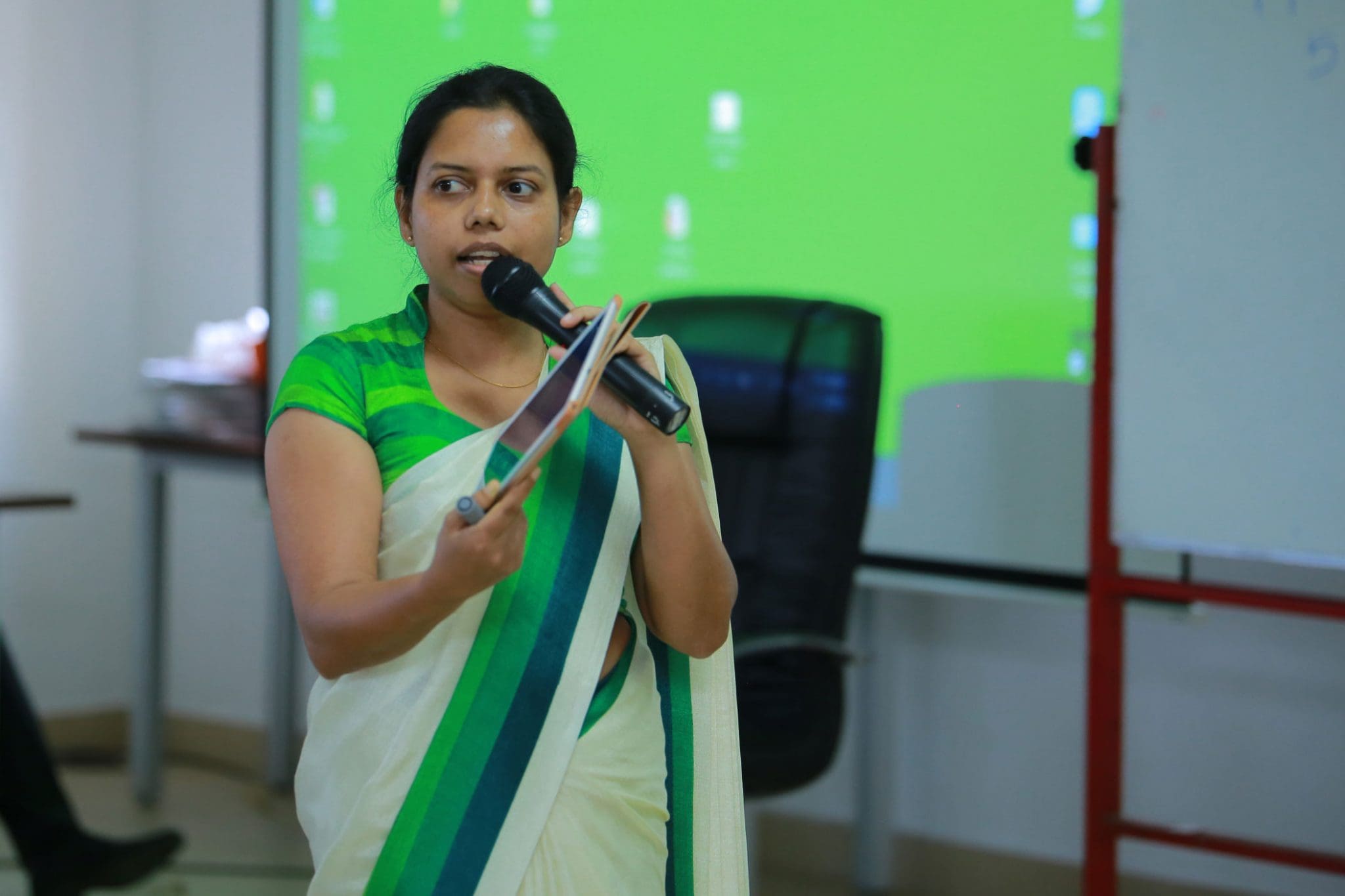
Elaborating further, she highlighted the immense value of the overall experience for the DCS, the Enumerators, and her. She says, “Working on a dedicated survey of this nature, which was also a first in the country, was a truly humbling and pleasant experience. We learnt new ways of or solidified our knowledge of planning surveys. The experiences at the training that included role play and debate on terminology were valuable because it gave insight into the level of attention to detail we must pay more attention in our use of words in a survey. This will help us in future survey planning too.”
The 13 teams were deployed to the 25 districts of the country. The main chosen sample was 2534 housing units, of which 2399 houses completed the questionnaire. However, 88 houses of those were ruled out due to there not being any eligible female in the house. Of the remaining 2311, the questionnaires were completed from 2264 individuals, while 27 responded that they did not understand some questions or were disabled. Another 12 questionnaires were partially completed. The final result was a 98% individual response rate.
Speaking about the results of organizing the survey, Mrs. Sajeewa Kodikara (Director – Sample Surveys) said, “The respondents’ support was essential and we are grateful to have got it. They wanted to share their stories with us. Listening to their stories was by no means easy. The horrors they described were beyond what we had imagined. To look at them while they remembered and spoke of it was an unforgettable experience and it will always stay with us. We now see this matter very differently, with a more personal understanding because we saw these women when they spoke about it. I now feel that we have a greater, even better, understanding of what violence against women is. We can use this in our future policy recommendations.”
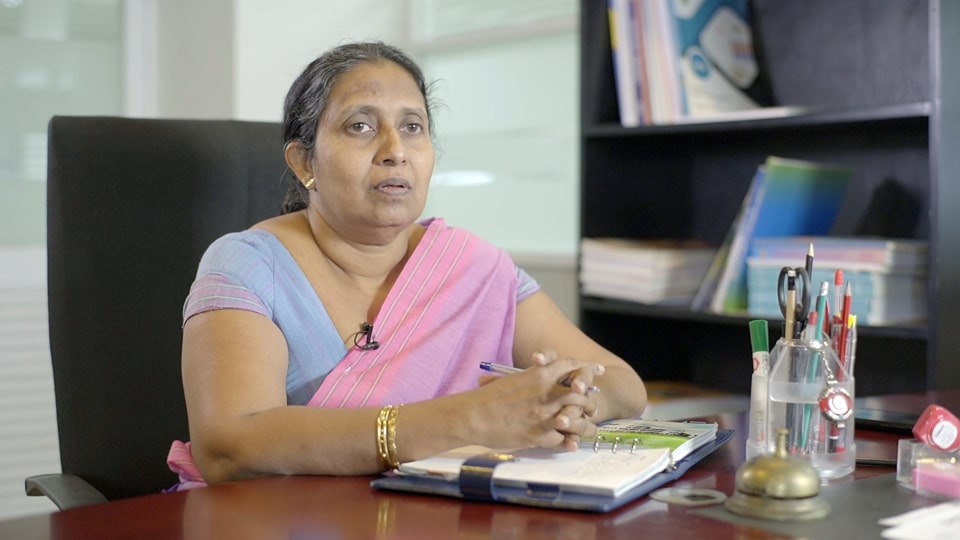
DIVERSITY
The survey reached all communities of Sri Lanka. The survey was carried out in Sinhala and Tamil, the two official languages of the country.
By ethnicity, the Sinhala population is about 74.9% of the national population and the Tamil population is about 15.3% of the national population. The latter is divided into Sri Lanka Tamil (11.2%) and Indian Tamil (4.1%) according to the Census of 2012. The rest of the country is divided into Sri Lanka Moor (9.3%), Burgher (0.2%), Malay (0.2%), Sri Lanka Chetty (5595 or 0.0%), Bharatha (1717 or 0.0%) and Other (0.1%).
Unique findings and experiences
One of the key changes that resulted from the survey was the attitudinal changes of the enumerators after experiencing the interviews in the field. “At first, during the workshops, we felt that due to the social and cultural restrictions, Sri Lankan women will not come forward and give enough information on their experiences of partner violence,” said a Statistical Officer who conducted the survey in Tamil. “But during the ‘Field Test,’ we observed the reality. With much courage, the women revealed the injustices they had faced as well as who inflicted such injustice on them. Fearlessly, they explained the physical and mental trauma they experienced. From this experience, we concluded that it is possible to conduct such a survey successfully. Respondents will give the answers for our questions if we ask them.”
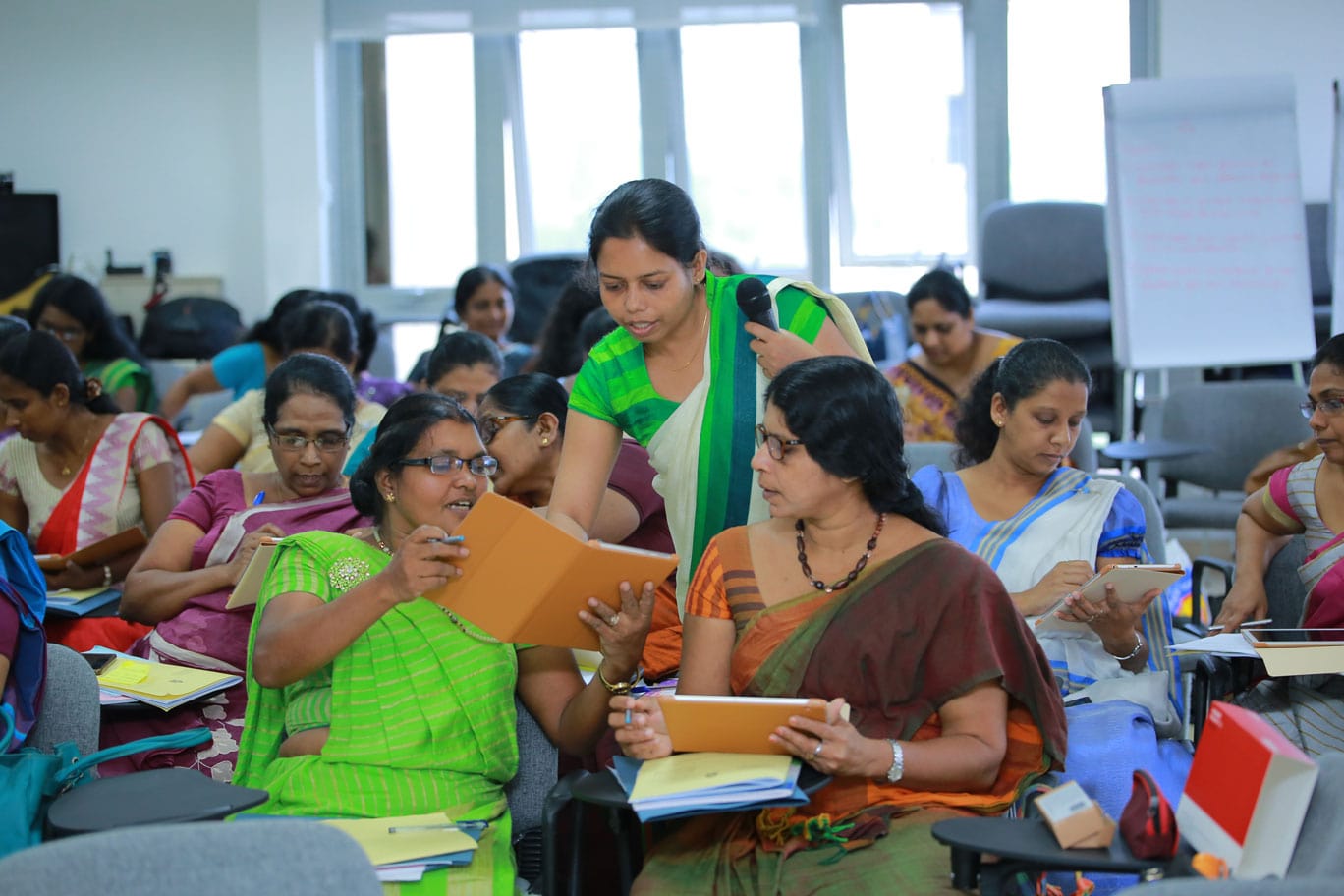
The same sentiment was also expressed by the Sinhala Enumerators. One Enumerator says, “When we were at the training, we thought that the respondents might not answer the questions. But, when we went to the field, the women spoke freely about what was in their minds. We realized that these women face many issues and are struggling with a lot of stress, but they downplay/manage that stress for the sake of their children and families.” It also highlights the cultural norms that prevent women from reporting and acting on the violence they face. Most are not aware that it is a violation of their right to live a life of dignity and respect.
The stories that these women shared evoked much emotion in the Enumerators, all of whom were women. They realized that it was not possible to understand the plight of these women from afar. “We can’t understand what a person is going through by staying inside offices. We can only do so when we face them and ask them these questions,” says a survey Enumerator. “The women are usually alone in the house. So, they appreciated having a government official come talk to them and ask them questions and offer them a moment’s respite.” This led to greater sharing of information and a closer bond between the Enumerator and the respondent: “We had to get close to them. At first, they did not want to talk to us about these issues since these are about private matters but once they got to know us and got close to us, they were willing to share more information,” says another Enumerator. Due to the experience of the enumerators, they were able to build confidence with the respondents in a short time and obtain insight into very personal information that they had not shared previously with anyone.
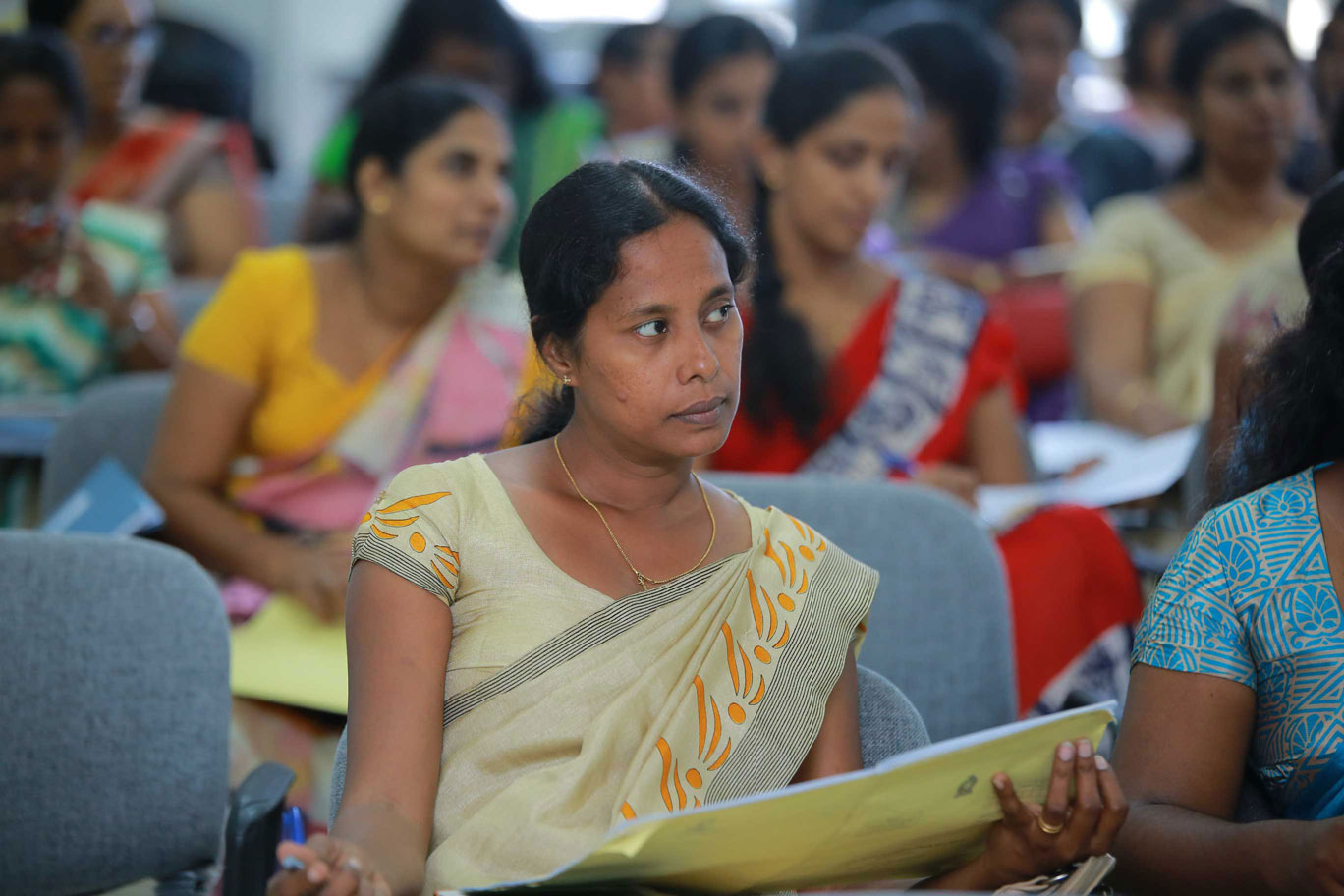
Even though some women were not available and the Enumerators had to revisit houses, the information collected and the experience of collecting the information had a lasting impact on the Enumerators. It was reiterated, “Even if they spoke to only 1 woman facing violence after visiting 10 houses, that experience really affected the Enumerators and stayed with them”
Given the uniqueness of the training and the survey, it was important to have excellent resource persons. With the aid of the UNFPA, the DCS was able to bring both international and local service providers who played a key role in educating the enumerators on the cases they are confronted with.
The program was created and sustained through the joint efforts of the DCS, UNFPA, and the funding from the Government of Canada.
PARTNERS OF THE PROJECT
The survey was administered by the Department of Census and Statistics (DCS) with technical assistance from the United Nations Population Fund (UNFPA) and funding from the Government of Canada.
PARTNERS OF THE PROJECT
The survey was administered by the Department of Census and Statistics (DCS) with technical assistance from the United Nations Population Fund (UNFPA) and funding from the Government of Canada.

Message from H.E David McKinnon,
High Commissioner of Canada to Sri Lanka
“Sexual harassment and gender-based violence are a symptom of entrenched gender inequalities worldwide, that have many underlying causes. Good data is needed to understand those, so effective policies can be developed. In keeping with the sharp focus of Canadian international assistance on women and girls, we have been very pleased to partner with UNFPA-Sri Lanka and the DCS, along with local organizations to produce the first national database in Sri Lanka on the prevalence of sexual and gender-based violence.”
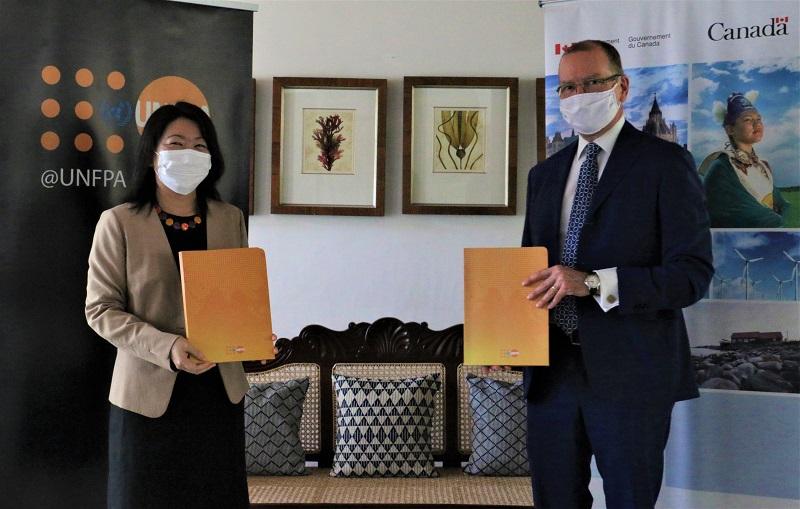
“This survey has helped create some awareness in this regard, and more importantly when the results are released to the public, I feel better information and knowledge would reach those in need.”
Enumerator
